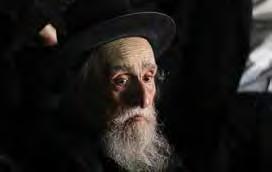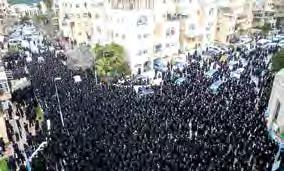
14 minute read
Israel News
Blast at Israeli Embassy in India
Israel believes that Iran is likely responsible for last week’s explosion next to its embassy in India.
No one was hurt in last Friday’s explosion, which detonated a few feet away from the Israeli embassy in New Delhi. The bomb blew out the windows of several cars and caused minor damage to a storefront.
Hours after the blast, investigators found a crudely handwritten note in English threatening Ambassador Ron Malka, who was called “the terrorist of a terrorist nation.” Warning that Israel’s envoy to India “is always under supervision,” it told Malka that “you cannot stop anyway no matter how hard you would pick, we can end your life anytime anywhere.”
The missive went on to threaten Israelis around the globe, writing that all “participants and partners” of Israeli “terrorist ideology will be no more in existence.”
“Now get ready for a big and better revenge for our heroes,” wrote the attackers, who identified as “India Hezbollah,” a group unknown to Western intelligence agencies. It ended by referencing “martyrs” killed by the U.S. and Israel, such as former Quds Force General Qassam Sulemeini and assassinated Hezbollah Commander Imad Mughniyeh.
The reference to slain Shi’ite terror leaders led Israel to blame Iran for the attack, which has a long history of targeting Israel’s overseas missions. In 1993, an Iran-sponsored attack on Israel’s embassy in Argentina killed 29 people while another bombing in Thailand in 2012 seriously injured the wife of an Israeli diplomat.
The Mossad intelligence agency is said to be probing the recent explosion and dispatched an explosives team to New Delhi within hours after the blast. Indian police say that initial findings suggest that the “very low-intensity improvised device” utilized an explosive known as PETN and was packed with ball bearings.
Investigators are currently probing the thousands of Iranian students studying in New Delhi and believe that the operation likely involved multiple people. Indian police also say that the use of PETN suggests that the blast may have been the work of al-Qaeda, which is known to have used the material in the past.
“Here, too, the suspicion is on some Iranian group. But involvement of the Islamic State or al-Qaeda cannot be ruled out. Access to PETN suggests involvement of either a trans-national terror group or a group sponsored by a State. The blast was deliberately kept low intensity as the aim, it appears, was to send a message,” a security establishment officer said.
Ya’alon Quits Politics

Former Defense Minister Moshe “Bogie” Ya’alon announced early this week that his Telem party will not run in the upcoming elections in March.
Acknowledging that Telem had little chance of crossing the electoral threshold, Ya’alon said on Monday that he would leave the race to avoid wasting votes that could go to other parties. The decision to leave politics came after all of the surveys commissioned over the past week showed Ya’alon far behind the 3.35% needed to make it into the Knesset.
“I believed that by running independently with Telem, we could increase the power of the [political] camp pushing for change,” Ya’alon

Now is the time to find your home in Israel
Others Hold Your Hand Through the Process; We Do It All For You!
Ask Us About Buying Groups Being Formed in Jerusalem, Ramot and Ramat Beit Shemesh
732-908-3955
Start your search before Pesach and when you close, we will provide you with a set of home appliances *
Bringing Process to Wealth Management
We understand that a client’s portfolio is more than their investment accounts, but really their entire fi nancial picture. Through a detailed fi nancial process and understanding who our clients are as people, we’re able to recommend risk-aligning portfolios. With Oppenheimer’s open architecture platform, we offer integrated fi nancial strategies that serve our client’s best interests. From there, we can actively update each portfolio to aim towards achieving short term and long term goals.
Michael J. Weinstein
Director – Investments Phone: (516) 733-1337 michael.weinstein@opco.com Oppenheimer & Co. Inc. 2 Jericho Plaza, Suite 113 Jericho, NY 11753
©2020 Oppenheimer Transacts Business on All Principal Exchanges and Member SIPC. 3196590.1 said in a statement. “This working assumption turned out to be wrong. In the political circumstances that have arisen, the battle for change requires me and Telem not to run in the upcoming elections.”
Ya’alon’s announcement came only a month after he left Yair Lapid’s Yesh Atid party for an independent Knesset bid. Ya’alon’s Telem had partnered with Yesh Atid ever since the two parties dissolved their alliance with Benny Gantz’s Kahol Lavan last May.
Previously, Ya’alon had been a senior Likud lawmaker and was often spoken of as a potential heir to Prime Minister Benjamin Netanyahu. But Ya’alon left the Likud after a bitter falling out with his former political patron and returned to politics in 2018 as part of the Kahol Lavan alliance.
Since rejoining the Knesset, Ya’alon has been renowned for his bitterness towards Netanyahu, accusing him of corruption and of endangering the country more than Iran. Prior to Monday’s announcement, Ya’alon recruited social activists leading the weekly anti-Netanyahu protests in Jerusalem for Telem’s Knesset list and referred to the prime minister as “the accused criminal.”

IDF, Mossad Chiefs at War?

A militant anti-Iran speech delivered by IDF Chief of Staff Aviv Kochavi led to a sharp war of words with Mossad head Yossi Cohen.
Last week, Kochavi delivered a blistering speech in which he warned President Joe Biden not to reenter the 2015 Iran nuclear deal. Calling such a move “a serious mistake,” Kochavi declared that he had ordered the military to prepare multiple plans to attack Tehran.
Kochavi’s militant address raised eyebrows in Israel and around the world. Unlike Israel’s elected leadership, the IDF’s senior brass generally favors the Iran deal and criticism of the U.S. is usually kept behind closed doors.
According to reports, Kochavi’s speech led to a deep disagreement with Mossad chief Yossi Cohen. The veteran spymaster, who is leading Israel’s effort to prevent Biden from returning to the Iran deal, reportedly told confidants that the IDF chief was “irresponsible” for publicly bashing the Biden administration.
Cohen added that any such criticisms should be voiced via diplomatic channels and not in televised speeches, alleging that Kochavi hurt Israel’s effort to influence the Biden administration. Cohen also stressed that Kochavi’s address was not coordinated with neither him nor Netanyahu and did not reflect official Israel policy.
Kochavi rejected the accusations, telling Army Radio that he was not required to coordinate strategic policy moves with the Mossad chief.
“It is a shame that there is someone in the defense establishment who chooses to publicly defame the chief of staff,” a source said.
“The chief of staff relayed his position to the Israeli public and is not required to update the head of the Mossad before he speaks. The Iranian issue doesn’t belong to Yossi Cohen, and even if there are differences of opinion, it is better that they stay behind closed doors.”
Israel and Kosovo Establish Ties

On Monday, Israel and Kosovo formally established diplomatic ties, with the Muslim-majority territory also recognizing Jerusalem as the Jewish state’s capital – putting it at odds with the rest of the Islamic world.
In a ceremony held over Zoom in Jerusalem and Pristina, Foreign Minister Gabi Ashkenazi and his counterpart from the Republic of Kosovo, Meliza Haradinaj Stublla, signed a joint declaration establishing ties.
This was the first time Israel es-

tablished relations with a country virtually.
Ashkenazi said he had approved Kosovo’s “formal request to open an embassy in Jerusalem.”
“The establishment of relations between Israel and Kosovo is an important and moving historical step that reflects the many changes the region has experienced in recent months,” Ashkenazi said. “Today, Kosovo officially joins the circle of countries that aspire to peace and stability and recognize Israel and Jerusalem as its capital.”
The foreign ministers signed two cooperation agreements – one to establish their diplomatic relations and the other relating to the activities of Israel’s international development agency Mashav.
The ceremony was broadcast live on the Foreign Ministry’s Facebook page.
US State Department spokesman Ned Price praised the sides for the “historic day.”
“When our partners are united, the United States is stronger. Deeper international ties help further peace and stability in the Balkans and Middle East,” he said.
During the virtual event, Ashkenazi unveiled the sign that will be placed at the entrance to the Kosovo embassy when it opens. Ashkenazi said he believed the embassy would be inaugurated by the Passover holiday at the end of March.
Ashkenazi also lauded Kosovo for adopting the definition of anti-Semitism written by the International Holocaust Remembrance Alliance, which was announced by Haradinaj in September.
The decision on mutual recognition between Kosovo and Israel was achieved last September at a summit of Kosovo-Serbia leaders at the White House in the presence of then-U.S. president Donald Trump. At the meeting, Belgrade also agreed to move its embassy in Israel to Jerusalem, which it has not yet done .
“I thank the United States for its efforts to advance world peace and to advance Israel’s relations with countries that we did not have diplomatic relations with until recently,” Ashkenazi said Monday.
When Kosovo opens its embassy in Jerusalem it will become the third country after the U.S. and Guatemala to open an embassy in Israel’s capital. Other countries, like Honduras, have pledged to move their embassies from Tel Aviv to Jerusalem as well.
Lockdown Until Friday

Israel’s Knesset voted to extend its lockdown until Friday as infection rates continue to climb despite a month-long lockdown.
The final government approval for extending the closure came on Sunday evening, only 15 minutes before the current lockdown expired, and extended the lockdown until 7 A.M. on Friday morning. Almost all of the current restrictions remained in place, including a ban on indoor dining, schools for all age groups, and prohibiting all non-essential businesses.
As part of the new lockdown, all incoming arrivals from overseas will be forced to quarantine at a government-run facility. The decision comes amid reports of hundreds of thousands of travelers purposely shirking the regulation mandating them to remain at home for 14 days.
Ministers also approved keeping Ben Gurion Airport shut for an additional two weeks to prevent COVID-19 mutations such as the South African variant from entering
Israel. However, an ad-hoc committee of senior officials from the Health and Justice Ministries was established to debate special requests from Israelis wishing to fly abroad.
Preceding the cabinet vote was hours of stormy debate between Prime Minister Benjamin Netanyahu over the lockdown’s length and severity. While Netanyahu wanted the lockdown extended until next Sunday, Gantz refused to approve what he called “a fake closure” and demanded to begin reopening the economy.
Pointing to two massive charedi funerals that occurred in Jerusalem on Sunday in defiance of the regulations, Gantz vowed not to “punish everyday Israelis” with a selectively enforced lockdown. Gantz, who heads the Kahol Lavan party in the national unity government, demanded the lockdown end on Wednesday with the entire education system reopening on Sunday.
Netanyahu blasted Gantz for his “populist” arguments he alleged were making it harder to prevent COVID-19 from spreading.
“We must extend the lockdown by a week and not politicize it, to focus on the violations of one public group or on other communities. Gatherings in every sector must be prevented,” Netanyahu said.
“To be clear: a gathering is a gathering is a gathering. It doesn’t matter if it’s ultra-Orthodox, secular people or Arabs. Unfortunately, there are gatherings on all sides, in all these public groups. We need to stop this immediately and stop politicizing it.”
Israel to Vaccinate 1K Palestinians
Israel will vaccinate over a thousand Palestinian medical workers in Judea and Samaria amid rising international pressure.
The decision was made last Thursday following consultations by the Health and Defense Ministries along with the National Security Council. The first batch of vaccines were transferred to the Palestinian Authority on Monday and will be followed by another delivery in mid-February.

In early January, Israel sent 1,000 doses of the vaccine to the Palestinian Authority to inoculate senior political figures, including President Mahmoud Abbas. A PA request for an additional 10,000 doses was denied.
Security officials have been warning that the Palestinian health care system is nearing collapse due to the overload of COVID-19 cases. Major General Kamil Abu Rukun, the IDF’s liaison to the PA, issued a memo last week urging Israel to vaccinate Palestinian doctors and nurses in order to combat the shortage of trained medical personnel.
The skyrocketing COVID-19 infections amongst Palestinians is also threatening Israel’s effort to combat the virus from spreading, as an estimated 100,000 Arab laborers are employed over the Green Line. With the aforementioned workers crossing from the West Bank into Israel daily, the high transmission rates amongst the PA could lead to an outbreak in Israel.
While Israel currently leads the world in inoculations, the 2 million doses of Russia’s Sputnik IV vaccine the PA ordered will only arrive by March. The disparity has led to international pressure on Israel to take responsibility for vaccinating West
Monumental Losses

Rav Meshulam Dovid Soloveitchik, zt”l
This week, Klal Yisroel was plunged into mourning twice on the same day, with the passing of Rav Meshulam Dovid Soloveitchik, zt”l, rosh yeshiva of Brisk, and Rav Yitzchok Scheiner, zt”l, rosh yeshiva of Kaminetz.
Thousands attended the levayas despite coronavirus restrictions, which took place in Yerushalayim.
Rav Scheiner passed away at the age of 98. He was born in Pittsburgh, Pennsylvania. His parents, who came from Galicia, did not have a way to formally give their son a Jewish education. As such, Rabbi Scheiner went to public school.
Rabbi Avrohom Dovid Bender, who came to the Scheiner home to fundraise, convinced the Scheiners to send their young son to New York to learn in a yeshiva. Rav Yitzchok’s parents jumped at the idea.
Rabbi Scheiner once recalled, “In general, he [Rabbi Avrohom Dovid Bender] would go to another neighborhood where he had relatives but once he came to our neighborhood and stayed with us, since we were one of the few families that ate Kosher. Hashem organized it in this way.
“Most meshulachim would come to their lodgings, eat and sleep and would not take notice of the kids in the family where they were staying. But Rabbi Bender was different. I was 16 then, and he asked me what I was learning so I told him that I had finished school. He was interested in me and asked my parents, ‘Why don’t you send him to a yeshiva in New York?’ My parents responded: ‘Yeshiva? What’s a yeshiva?’ They were very devout, kept Shabbos and kashrus, maybe they heard of yeshivos in Poland but had not idea that there could be such institutions in America.
“He said: ‘I’ll take him there.’”
Rabbi Scheiner learned at Yeshiva College and at Yeshiva Torah Vodaas. He married a granddaughter of Rabbi Boruch Ber Leibowitz, the Rosh Yeshiva of Kaminetz.
During the 1960s, Rabbi Scheiner taught at a Yeshiva in Montreux, Switzerland. When Rabbi Scheiner’s father-in-law passed away, Rabbi Scheiner took over the position of rosh yeshiva along with his brother-in-law.
Rav Meshulam Dovid Soloveitchik passed away this week at the age of 99.
Rabbi Soloveitchik was the fifth of twelve children born to the Rav Velvel Soloveitchik, the Brisker Rav, and was the grandson of Rav Chaim Brisker. He was the last surviving son of his father.
Rav Meshulam Dovid was born in Europe and managed to escape to what was then called Palestine with his father and some siblings. Three of his younger siblings, along with his mother, perished in the Holocaust.
Rav Meshulam Dovid married the daughter of Rabbi Asher Sternbuch and was a brother-in-law of Rabbi Moshe Sternbuch, one of the leaders of the Eda Chareidis. Rabbi Meshulam Dovid was close with the heads of the Eda Chareidis and shared their ideological opposition to Zionism and the state of Israel.
In the 1970s, with Rav Leizer Yudel Finkel’s encouragement, Rav Soloveitchik opened up a yeshiva, leading the talmidim with great dedication and saying shiur up until very recently.
Rav Meshulam Dovid was the epitome of Bais Brisk. As such, he was medakdek in many matters of halacha. Learning Torah and delving into its depths was important to him. Mesorah and halacha were paramount.
His son, Rav Yitzchok Zeev, was appointed to succeed him in the Brisk yeshiva.

Levaya of Rav Meshulam Dovid Soloveitchik, zt”l Rav Yitzchok Scheiner, zt”l











